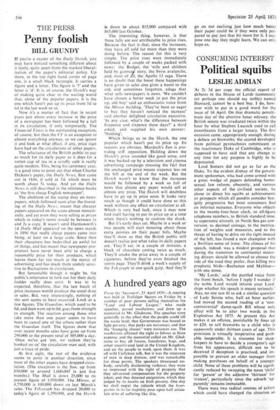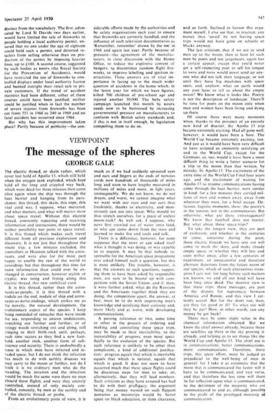CONSUMING INTEREST
Political squibs
LESLIE ADRIAN
At 2s 3d per copy the official report of debates in the House of Lords (commonly (or perhaps one should say nobly) named Hansard, cannot be a best buy. I do, how- ever wish to put in a good word for the issue of 16 April. On that dramatic penulti- mate day of the abortive lunar odyssey, the British senate was irradiated twice within the hour by what Stephen Leacock used to call moonbeams from a larger lunacy. The first occasion came, appropriately enough, during a debate on fireworks; the second developed from political pyrotechnics reminiscent of the reactionary Duke of Cambridge, who is supposed to have said that any change at any time for any purpose is highly to be deprecated.
Lord Somers did not go as far as the Duke. To the evident dismay of the govern- ment spokesman, who had come armed with a great wodge of papers defending homo- sexual law reform, obscenity, and various other aspects of the civilised society, he chose to direct his squibs at achievements or prospects which all pundits consider ben- ignly progressive but most consumers find an infernal nuisance. Everyone who objects to the twenty-four-hour clock, to all-figure telephone numbers, to British standard time, to supersonic aircraft, to North Sea gas con- version, to decimal coinage, to the metrica- tion of weights and measures, and to the threat of having to drive on the right instead of the left, has found a new champion with a Swiftian sense of irony. The climax of his speech, indeed, was a modest proposal that during the transition to continental motor- ing drivers should be allowed to choose the side of the road they prefer, thus killing two prophetic birds—Buchanan and Malthus— with one stone.
'My Lords,' said the puzzled voice from the front bench, 'before I reply I wonder if the noble Lord would inform your Lord- ships whether his speech is meant seriously.' Alas, no one saw fit to ask a similar question of Lady Serota who, half an hour earlier, had moved the second reading of a 'non- controversial' damp-squib Bill whose only effect will be to alter two words in the Explosives Act 1875. At present this Act makes it an offence, punishable by fines up to £20, to sell fireworks to a child who is apparently under thirteen years of age. This provision is virtually inoperative and prob- able inoperable. It is tiresome for shop- keepers to have to decide a youngster's age from his appearance, difficult not to be deceived if deception is practised, and im- possible to prevent an older teenager from making purchases on behalf of a younger child. None of these problems will be signifi- cantly reduced by swopping the noun 'child' for 'person' or the adjective 'thirteen' for 'sixteen', particularly since the adverb 'ap- parently' remains immutable.
There were two radical courses of action which could have changed the situation as distinct from the vocabulary. The first, advo, cated by Lord St Davids two days earlier, would have limited the sale of fireworks to people holding a local authority permit, en- sured that no one under the age of eighteen could hold such a permit, and deterred re- tailers from selling otherwise than on pro- duction of the permit by imposing heavier fines, up to £100. A second course, suggested by such bodies as ROSPA (the Royal Society for the Prevention of Accidents), would have restricted the use of fireworks to con- trolled displays under local authority licence and banned outright their retail sale to pri- vate customers. If the trend of accident statistics had been different, either of these courses could have been justified; neither could be justified when in fact the number of severe injuries from fireworks has been cut from 551 in 1966 to 240 in 1969 and no fatal accident has occurred since 1964.
But why has this improvement taken place? Partly because of publicity—the con-
siderable efforts made by the authorities and by safety organisations each year to ensure that fireworks are correctly handled, and the influence of such television documentaries as `Remember, remember' shown by the Floc in 1968 and again last year. Partly because of pressure—the agreement of the manufac- turers, in close discussion with the Home Office, to reduce the explosive content of bangers, to discontinue random flight fire- works, to improve labelling and ignition in- structions. These answers are of vital im- portance in facing up to the much wider question of accidents in the home which, in the latest year for which we have figures, killed 700 children of pre-school age and injured another 30,000. The baby safety campaign launched this month by ROSPA needs now to be buttressed by increasing governmental pressure on manufacturers to conform with British safety standards and, if this is not in itself enough, by legislation compelling them to do so.







































 Previous page
Previous page